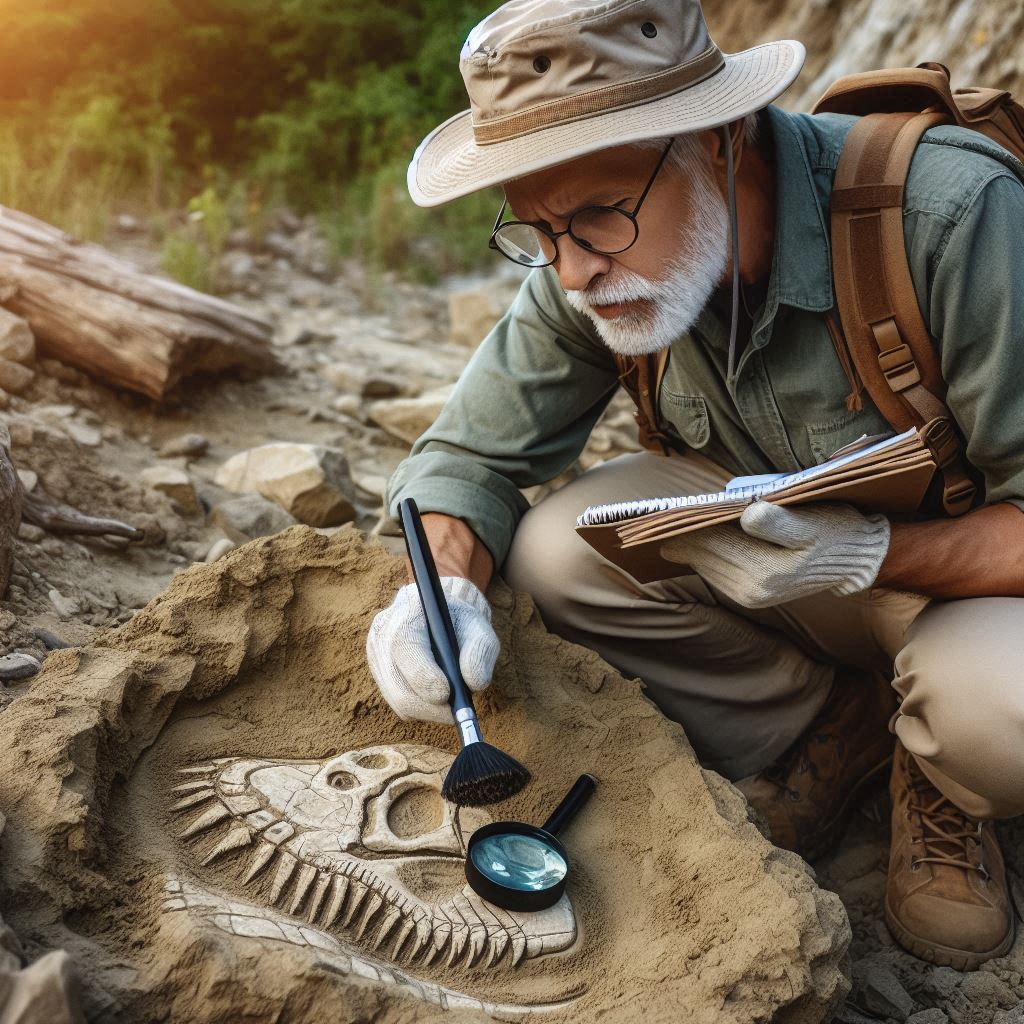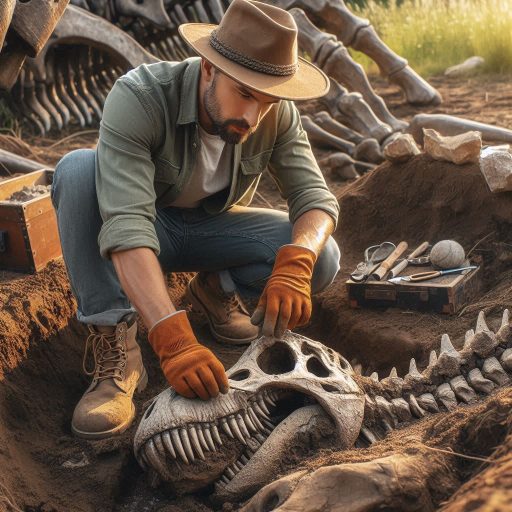Introduction
A paleontologist studies fossils to understand the history of life on Earth.
They analyze ancient plants, animals, and environments to piece together past ecosystems.
Paleontologists work in the field, digging for fossils, and in labs, studying their findings.
The role of a paleontologist is crucial in uncovering Earth’s evolutionary past.
By examining fossil evidence, they reveal how species have adapted and evolved over millions of years.
Their work helps us understand biodiversity, extinction events, and environmental changes.
Paleontology is essential in learning about Earth’s history.
It provides insights into climate change, the origins of life, and how ecosystems responded to global shifts.
These findings offer context for present-day environmental challenges.
To become a paleontologist, you need a strong educational foundation.
Start with a bachelor’s degree in geology, biology, or a related field.
Gain fieldwork experience through internships or volunteering.
Pursue a master’s degree for specialized knowledge in paleontology.
A Ph.D. is often necessary for research roles or academia.
Along the way, develop skills in data analysis, research methods, and scientific writing.
The journey to becoming a paleontologist requires dedication, but it offers a fulfilling career in exploring Earth‘s ancient life.
High school preparation
Science and Math Courses: Building the Foundation
Taking science and math courses is critical for anyone interested in paleontology.
These subjects form the foundation of this field.
Paleontology requires strong knowledge of biology, chemistry, and earth sciences to understand fossils and ancient environments.
Math is equally important for data analysis, statistical modeling, and precise measurements in the field.
High school students should focus on courses like biology, chemistry, physics, and algebra.
These subjects help develop the problem-solving skills needed in paleontology.
Advanced Placement (AP) or International Baccalaureate (IB) science courses are especially beneficial.
They can give students a competitive edge when applying for colleges with strong paleontology programs.
College-bound students should also consider taking calculus and statistics.
Paleontologists use these mathematical tools to measure fossil size, estimate the age of specimens, and analyze ecological trends.
Building a solid foundation in science and math is the first step toward a successful career in paleontology.
Join Clubs or Activities Related to Geology or Biology
Involvement in extracurricular activities related to geology or biology enhances academic learning.
It also helps students connect with like-minded peers.
Many high schools offer clubs focused on science, including biology, geology, and environmental science clubs.
These clubs provide opportunities to discuss scientific discoveries and participate in hands-on activities.
For example, a biology club might organize trips to natural history museums or guest lectures from scientists.
Joining a geology club can help students gain practical experience with rocks, minerals, and fossils.
It can also introduce students to the importance of fieldwork in paleontology.
Additionally, many universities host paleontology or biology clubs that offer activities like fossil digs or workshops.
Clubs provide a platform for students to deepen their knowledge, practice leadership, and prepare for future fieldwork.
These experiences can spark a passion for the subject and create valuable networking opportunities with professionals in the field.
Participate in Relevant Internships or Field Experiences
Gaining hands-on experience through internships or fieldwork is essential for aspiring paleontologists.
Many universities and museums offer internship opportunities for students interested in paleontology.
Interns may assist with cataloging fossil collections, participating in research projects, or preparing specimens.
These experiences allow students to work alongside professional paleontologists and gain real-world insights into the field.
Field experiences are particularly valuable, as paleontology often requires spending time in the field.
Participating in a fossil dig or geological survey can give students firsthand experience in excavation techniques.
Students learn how to identify fossils, record data, and use specialized tools during these experiences.
Fieldwork also teaches the importance of patience and attention to detail, both crucial qualities for paleontologists.
High school students can also seek out summer programs or camps focused on paleontology or geology.
These programs provide immersive experiences that enhance classroom learning.
Building a resume with internships and field experiences demonstrates commitment and passion for the subject, making students more competitive for college programs and future careers.
Undergraduate studies
Pursue a Degree in Geology, Paleontology, or a Related Field
To become a paleontologist, begin by earning a degree in geology, paleontology, or a related field.
Most paleontologists start their educational journey with a bachelor’s degree in geology.
Geology provides the foundational knowledge needed to study Earth’s history and fossil records.
You may also choose to pursue a degree specifically in paleontology, if available at your chosen institution.
Many universities offer degrees in earth sciences with concentrations in paleontology.
Degrees in related fields like biology or environmental science can also prepare you for this career.
It’s essential to select a program that includes significant fieldwork opportunities.
Hands-on experience will allow you to learn fossil excavation techniques, as well as rock and mineral identification.
A strong academic background in Earth‘s natural processes will support your understanding of fossil formation.
Research your options carefully and choose a program that aligns with your career goals.
Make sure the program offers courses that directly relate to paleontology.
Take Courses in Biology, Chemistry, and Physics
Beyond geology or paleontology-focused courses, take classes in biology, chemistry, and physics.
These subjects are essential for understanding the processes behind fossilization, evolution, and Earth‘s environmental changes.
Biology helps you understand ancient organisms and their evolutionary connections to modern species.
Knowledge of genetics, species classification, and ecosystems is crucial when studying fossils.
Chemistry classes will teach you about the composition of fossils and the chemical processes involved in their preservation.
You will learn how minerals replace organic material in bones during fossilization.
This understanding is essential when analyzing fossils and dating them using techniques like radiometric dating.
Physics is another critical subject for aspiring paleontologists.
It will help you understand the forces shaping Earth over millions of years.
Geophysics concepts help explain tectonic movements and other forces that impact fossil distribution.
Physics also supports the study of dating methods that measure isotopic decay in rocks and fossils.
Having a broad scientific foundation in these subjects will be crucial to your future research.
Conduct Research or Assist Professors in Paleontology Projects
In addition to coursework, engaging in research is key to developing your skills.
Many paleontologists begin by assisting professors with their research projects.
This hands-on experience is invaluable for gaining practical skills.
Working in labs or in the field, you will learn excavation techniques and methods for analyzing fossils.
Seek out opportunities to join research teams during your undergraduate or graduate studies.
Many universities offer paleontology-specific research opportunities, and professors often need students to assist with projects.
These projects can range from studying ancient ecosystems to cataloging fossils in museums.
This experience will enhance your academic resume and help build connections in the field.
Early involvement in research also allows you to publish findings, which is critical for future job prospects or graduate school applications.
Read: The Role of Chemists in US Environmental and Sustainability Efforts
Field Experience
Volunteer at Museums or Research Institutions
Museums and research institutions are valuable resources for aspiring paleontologists.
Volunteering at these places provides firsthand experience with fossil collections.
You‘ll also learn how professionals handle and preserve delicate specimens.
Many museums offer volunteer programs that allow you to work alongside scientists.
This helps you become familiar with different types of fossils, tools, and techniques.
You can also learn about cataloging specimens, an important skill for paleontologists.
By working closely with experts, you gain insight into the research process.
This exposure will help you understand the importance of museum collections in paleontology.
Additionally, building relationships with professionals in these settings can open doors for future opportunities.
Join Paleontological Expeditions or Dig Sites
Fieldwork is a core aspect of paleontology, and joining expeditions is an excellent way to gain experience.
Many universities and research organizations host paleontological digs, and they often seek volunteers.
These expeditions involve finding, excavating, and documenting fossils in various locations.
Participating in these digs helps you develop critical fieldwork skills.
You‘ll learn how to properly excavate fossils, document findings, and handle specimens carefully.
Fieldwork also teaches problem-solving skills, as unexpected challenges often arise in the field.
Working alongside experienced paleontologists gives you insight into the day-to-day tasks of a field researcher.
Additionally, participating in these expeditions can lead to valuable networking opportunities within the paleontology community.
Gain Hands-On Experience in Fossil Collection and Analysis
Paleontology isn‘t just about discovering fossils; it‘s about analyzing and interpreting them.
Hands-on experience in fossil collection and analysis is crucial for developing your skills.
When you participate in fossil digs, you‘ll practice excavation techniques.
After excavation, you‘ll need to carefully transport fossils to ensure their preservation.
In museums or labs, you‘ll get the chance to study these fossils up close.
Working with fossilized bones, teeth, and imprints helps you understand the different aspects of paleontological research.
You‘ll also learn how to analyze fossils to draw conclusions about ancient ecosystems.
Data analysis is an important part of the job, and practice will enhance your ability to interpret findings.
As you gain more experience, your confidence in identifying and analyzing fossils will grow.
Developing these hands-on skills is essential for becoming a successful paleontologist.
By volunteering, joining expeditions, and gaining practical skills, you‘ll prepare yourself for a rewarding career in paleontology.
These experiences will not only strengthen your knowledge but also provide invaluable professional connections in the field.
Read: Day in the Life: An Environmental Scientist‘s Typical Day
Graduate Studies
Pursue a Master’s or Ph.D. in Paleontology
To advance in paleontology, consider pursuing a master’s or Ph.D. in the field.
A bachelor’s degree offers foundational knowledge, but a graduate program provides the depth needed for specialized research.
Many employers, especially academic and research institutions, require advanced degrees for higher-level positions.
Graduate programs in paleontology offer a chance to focus on specific areas of interest.
As a graduate student, you can explore diverse subjects, such as dinosaur evolution, fossil ecosystems, or ancient climates.
Courses typically include geology, biology, and advanced paleontology, allowing you to deepen your expertise.
A master’s degree typically takes two to three years, while a Ph.D. may take five to seven.
During this time, you will work on research projects, often involving fieldwork.
The hands-on experience is invaluable for developing essential skills, such as fossil excavation and lab techniques.
Focus Research on Specific Areas of Interest
A key aspect of graduate school is identifying and focusing your research on a specific area of paleontology.
This can be anything from the evolution of certain species to studying ancient environments.
The field is broad, offering many exciting research opportunities.
Choosing a topic that genuinely excites you is crucial because it will fuel your long-term commitment.
Your research should fill gaps in existing knowledge or provide new insights.
Many paleontologists focus on understanding how organisms lived, interacted, and evolved.
Others study extinction events or reconstruct past ecosystems using fossil evidence.
You can also focus on micropaleontology, examining microscopic organisms that reveal information about Earth’s past climates.
Selecting a niche helps you become an expert in that field.
It makes you more attractive to potential employers or academic institutions.
The more unique and specialized your research, the more opportunities you’ll have to make significant contributions to the field.
Collaborate and Publish in Academic Journals
Collaborating with other researchers is essential in paleontology.
Research projects often require expertise in various areas, such as geology, biology, and chemistry.
By working with others, you gain new perspectives and broaden your research scope.
Successful collaboration can lead to joint research projects, expanding your network in the scientific community.
Working together on fossil digs, sharing lab techniques, or even collaborating internationally can help you grow as a researcher.
The relationships you build through collaboration can lead to future opportunities, including grants or joint publications.
Publishing your research in academic journals is vital for sharing your findings with the scientific community.
It also establishes you as a credible expert.
Peer-reviewed journals, such as Paleobiology or Journal of Vertebrate Paleontology, are respected outlets for new discoveries.
Publishing your work can also open doors to conference presentations and further research opportunities.
Collaborating and publishing are essential to building your reputation and advancing your career in paleontology.
Read: The Impact of Technology on the Chemist Profession in the US

Specialized training
Attend Workshops or Conferences in Paleontology
Attending workshops and conferences is crucial for building your paleontology career.
These events offer hands-on experience in fossil excavation, preparation, and identification.
They provide a chance to network with experienced paleontologists and researchers.
Through these connections, you can gain valuable insights into the latest research and methodologies.
Workshops often focus on specific techniques, such as fossil cleaning or digital reconstruction.
By participating in these, you enhance your practical skills in handling fossils.
Conferences, on the other hand, allow you to stay informed about current debates and discoveries.
Many paleontologists present their research findings at these events.
Attending their talks can give you a clearer understanding of where the field is heading.
Moreover, workshops and conferences offer opportunities for collaboration.
You may meet potential mentors, research partners, or employers.
These gatherings also help you build a professional reputation in the paleontological community.
As you attend more events, you’ll become more confident in your abilities and knowledge.
This will set you apart when you apply for jobs or research positions.
Develop Skills in Fossil Preparation and Curation
Developing fossil preparation and curation skills is essential for a career in paleontology.
Fossil preparation involves removing rock from around fossils, cleaning them, and stabilizing them for research or display.
These tasks require precision and attention to detail, as fossils can be incredibly fragile.
Curation refers to the process of organizing and maintaining fossil collections.
Many paleontologists work in museums or universities, where they are responsible for preserving fossil specimens.
Knowing how to properly label, store, and document fossils ensures they remain in good condition for future study.
By honing your fossil preparation skills, you increase your employability in the field.
Many museums and research institutions seek individuals who can prepare fossils for exhibitions or analysis.
Taking courses or seeking internships in fossil preparation can help you gain these skills.
Likewise, developing curation skills will make you valuable in both research and museum settings.
Properly curated fossils are vital for scientific study.
By learning how to handle and catalog fossils, you contribute to the advancement of paleontological research.
Stay Current on Advancements in the Field Through Continuing Education
Continuing education is key to staying relevant in the ever-evolving field of paleontology.
Advancements in technology, such as 3D scanning and radiometric dating, constantly change how we study fossils.
To stay competitive, you must stay updated on these changes.
Taking online courses, attending seminars, or reading recent publications are excellent ways to stay informed.
Many universities and organizations offer paleontology-specific continuing education programs.
These programs allow you to learn about the latest techniques and discoveries.
Additionally, joining professional organizations like the Society of Vertebrate Paleontology keeps you in the loop.
These groups provide members with access to exclusive resources, journals, and events.
By engaging with continuing education, you ensure that your skills and knowledge remain up-to-date.
Read: US Chemistry Conferences and Symposiums to Attend in 2024
Transform Your Career Today
Unlock a personalized career strategy that drives real results. Get tailored advice and a roadmap designed just for you.
Start NowExplore Further: Networking Tips for Aspiring and Practicing Optometrists
See Related Content: Path to Becoming a Pharmacologist: Education Guide
Networking and professional development
Attend Paleontology Conferences and Events
Attending paleontology conferences is vital for staying updated on the latest research in the field.
These events offer valuable opportunities to meet leading experts and learn about new discoveries.
Conferences often feature presentations, panel discussions, and workshops, providing a platform for paleontologists to share their work.
Aspiring paleontologists can gain insight into emerging research trends and technologies.
Participating in these events helps build professional networks and fosters collaboration.
Engaging with fellow attendees can lead to long-term partnerships or mentorship opportunities.
It‘s also an excellent way to find potential collaborators for future projects.
Students can often find discounted or even free attendance opportunities, making these events accessible.
Attending local, national, or international conferences can expand your horizons beyond classroom learning.
By immersing yourself in these settings, you enhance your knowledge and professional connections simultaneously.
Join Professional Organizations like the Society of Vertebrate Paleontology
Joining professional organizations is essential for any serious paleontologist.
The Society of Vertebrate Paleontology (SVP) is one such organization that offers numerous resources.
Members gain access to exclusive journals, conferences, and networking opportunities.
The SVP encourages active participation in the field by supporting students, early-career researchers, and seasoned professionals.
Membership provides a sense of community with individuals who share a passion for vertebrate paleontology.
These organizations often host events where you can present your research or attend lectures by field experts.
Being part of a professional organization boosts your credibility and opens doors to potential research funding.
You‘ll also receive newsletters and updates about advancements in paleontology, keeping you informed of crucial developments.
Moreover, these groups advocate for the preservation of fossil records and ethical research practices, helping ensure the sustainability of the field.
Joining can also foster a sense of belonging and professional pride.
Collaborate with Colleagues and Mentors in the Field
Collaboration is key to success in paleontology.
Working with colleagues and mentors enriches your research and career development.
In paleontology, the sharing of ideas and data often leads to groundbreaking discoveries.
Collaborating with seasoned professionals allows you to learn from their experience and knowledge.
Mentors can provide guidance on your research and help you navigate career challenges.
Joint research projects often lead to co-authored publications, boosting your professional portfolio.
Collaboration also improves your problem-solving skills as you work with others to interpret complex fossil data.
Engaging with others fosters creativity and broadens your approach to paleontological questions.
Collaborating with international researchers can offer new perspectives and techniques from around the world.
Additionally, mentors often help open doors to new research opportunities and grants.
Building strong relationships in the field can significantly accelerate your growth as a paleontologist.
By attending events, joining organizations, and collaborating, you can stay connected and grow professionally.
You Might Also Like: The Relationship Between Archaeology and Anthropology
Discover More: Innovative Anthropology Research Projects
Job opportunities and career paths
Employment Options in Museums, Universities, and Research Institutions
Once you have the necessary qualifications as a paleontologist, the next step is exploring job opportunities.
Museums, universities, and research institutions provide valuable platforms for those interested in paleontology.
Many paleontologists begin their careers working in museums.
They curate exhibits, preserve fossil collections, and engage in public education.
In museums, paleontologists often contribute to exciting research projects, while simultaneously sharing discoveries with the general public.
Universities are another common career avenue.
You may find employment as a professor or researcher, where you can teach, guide students, and conduct original research.
Academic positions also offer the chance to mentor future paleontologists.
Additionally, many paleontologists at universities collaborate with colleagues worldwide, contributing to groundbreaking discoveries and the advancement of the field.
Research institutions, such as geological or natural history organizations, also hire paleontologists.
They often focus on scientific research and exploration, with paleontologists leading projects aimed at discovering and analyzing fossils.
These institutions may be publicly funded or part of a larger organization, giving you the resources needed for long-term research.
Consider Consulting or Working in the Private Sector
While traditional academic and research roles are common, there are also opportunities in the private sector.
Many paleontologists work as consultants for environmental and engineering firms.
In this role, you help companies comply with regulations when they uncover fossils during construction projects.
Your knowledge can ensure that fossils are properly preserved, while also allowing the construction work to continue.
Oil, gas, and mining companies also seek paleontologists for their expertise.
They rely on paleontologists to interpret geological data and identify fossil fuel resources.
Working in these industries can be lucrative and provide hands-on experience with geological formations.
Additionally, consulting in the private sector often involves a more flexible schedule and a variety of projects, keeping the work dynamic and interesting.
For those with entrepreneurial ambitions, starting your own consulting firm is another option.
You can offer services to multiple clients, helping companies, museums, or government agencies with paleontological assessments and fossil discoveries.
This path can lead to a diverse portfolio of projects and collaborations across industries.
Pursue Opportunities for Fieldwork or Academic Positions
Fieldwork is a core aspect of paleontology.
Many paleontologists seek positions that allow them to engage in fieldwork, whether through universities, museums, or private research firms.
Fieldwork can include excavating fossils, mapping prehistoric environments, and analyzing sediment layers.
This hands-on work often contributes directly to significant scientific discoveries.
For those more inclined toward academia, pursuing a teaching career offers stability.
Professors typically have the opportunity to conduct research, publish papers, and present findings at conferences.
Teaching positions provide a platform for paleontologists to share their passion and knowledge with students while continuing to advance the field through research projects and fieldwork opportunities.
Conclusion
To become a paleontologist, start by earning a bachelor’s degree in geology, biology, or a related field.
Coursework in earth sciences, evolution, and chemistry is crucial for building foundational knowledge.
During your undergraduate years, gain experience through internships or volunteering at museums or research digs.
This hands-on exposure is invaluable.
Next, pursue a master’s degree, focusing on a specific area of paleontology like vertebrate fossils or ancient ecosystems.
Graduate programs often involve research projects, offering deeper insights into paleontological methods.
Many aspiring paleontologists continue on to earn a Ph.D., which is typically required for higher-level research positions or university teaching roles.
Success in this field demands more than academic achievement; it requires deep passion and unwavering dedication.
Paleontologists spend countless hours in the field and the lab, often working in harsh conditions.
Their commitment to uncovering Earth’s prehistoric mysteries fuels their persistence.
For those passionate about ancient life, the path is challenging but rewarding.
Stay focused on your academic goals, seek mentorship, and never stop learning.
With dedication, you can contribute to significant discoveries and leave your mark on the fascinating world of paleontology.
Keep pushing forward and believe in your potential to succeed.
[E-Books for Sale]
The Big Book of 500 High-Paying Jobs in America: Unlock Your Earning Potential
$19.99 • 500 High-Paying Jobs • 330 pages
Explore 500 high-paying jobs in America and learn how to boost your career, earn more, and achieve success!
See All 500 High-Paying Jobs of this E-Book
1001 Professions Without a Degree: High-Paying American Jobs You Can Start Now
$19.99 • 1001 Professions Without a Degree • 174 pages
Discover 1001 high-paying jobs without a degree! Unlock career tips, skills, and success strategies for just $19.99!




